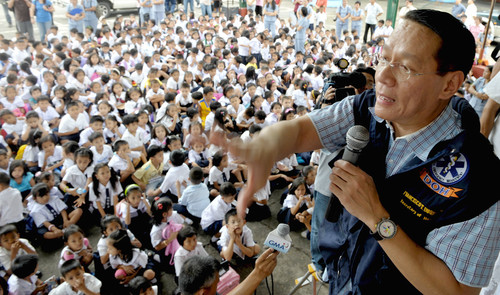
The WHO letter dated June 30, 2009 and signed by WHO Regional Director Dr. Shin Young-soo put on record “my personal appreciation of the exceptional collaboration established between the Government of the Philippines and the World Health Organization in the fight against Pandemic H1N1 2009. I commend your leadership and tireless efforts in responding to this emerging threat to the health of the people of the Philippines”.
This commendation made our DOH secretary Francisco Duque III grateful. “Our efforts were recognized and didn’t go to waste. We appreciate that the WHO finds our response efficient and that it is confident on the quality of our laboratory diagnoses,” Duque said.
Meanwhile, to keep us all aware about this novel virus, here is DOH report number 54 on A(H1N1) virus:
According to the WHO, for countries already experiencing community-wide transmission, the focus of A (H1N1) surveillance activities must shift to reporting against the established indicators for the monitoring of seasonal influenza activity. Those countries are no longer required to submit regular reports of individual laboratory-confirmed cases and deaths to the WHO.
“The WHO will no longer be issuing global table updates that show the number of confirmed cases for all countries but will instead continue to document the global spread with updates describing the situation in newly affected countries,” Duque said.
The WHO said that as the pandemic evolves, the data needed for risk assessment are also changing and that at this point, its further spread is considered inevitable. It said that the increasing numbers of cases in many countries with sustained community transmission is making it extremely difficult to confirm them through laboratory testing.
Because the DOH is set to abide by the newly recommended reporting system of WHO for A (H1N1), it is now reviewing and adjusting its surveillance systems to fit the monitoring of the novel virus in its regular surveillance of Influenza-like illnesses (ILI) in the country.
Duque stressed that globally and locally, the novel virus has caused mild illness in the majority of affected patients with expected full recovery even without medical treatment. However, there are some cases that become serious especially if the patients have underlying pre-medical conditions. Like the other seasonal flu strains, A (H1N1) can cause severe viral pneumonias and other flu complications” Duque said.
“So, again, we are urging the public to be more vigilant in guarding their health against A (H1N1) despite its generally mild clinical manifestations in most of the cases reported in the country,” Duque stressed.
The Secretary said that such highly vulnerable conditions include uncontrolled diabetes, frank cardiovascular disease, chronic obstructive pulmonary disease, chronic liver and kidney disease. He added that those who are organ transplant recipients, immunocompromised, and suffering from other infections like HIV/AIDs and TB; pregnant women and the very young and the elderly are more at risk of developing serious cases of A (H1N1).
“We are stressing this point because of the first previously reported case of death in the country involving a patient with an incidental finding of A (H1N1). We now have to be more aggressive in targeting segments of patients with a high vulnerability to fatal flu complications,” Duque pointed out.
“We want to make it clear that high-risk groups, once they have the flu symptoms, should immediately go to their doctor. They should not wait for their symptoms to worsen because they are prone to many other infections such as our seasonal flu strains,” Duque clarified.
“We also advise parents and guardians to seek immediate professional help if they see danger signs in children and other family members which indicate rapid progression of the disease or a worsening of symptoms. Likewise healthcare providers should stick to the basic protocol of managing acute respiratory infections among children by being vigilant of these danger signs which include rapid breathing, excessive drowsiness, poor intake or dehydration. In adults, chest pain, prolonged fever or labored breathing should prompt warnings to see a doctor,” Duque reminded the public.
Meanwhile, Duque advised the public to continue following the recommendations of the DOH on proper handwashing, cough etiquette, and other hygiene practices.
“The best defense against A (H1N1) and other diseases is to boost your immune system. Most people can fight off this virus without special medications or hospitalization. You can stay at home and take supportive care like plenty of fluids, vitamins and bed rest,” Duque stressed.
In this connection, Duque strongly advised the public to be vigilant over advertisements or fraudulent sales promotion practices of food supplements, vitamins or other products that create an erroneous impression that the product concerned could cure or treat the A (H1N1) virus.
“It must be stressed that to date, there are no food supplements, vitamins or vaccines that cure or treat the novel virus,” Duque stressed.
“We are warning manufacturers and distributors of these products that any claim in their advertisements that it can cure or treat A (H1N1) can be an outright violation of Section 112 of the Republic Act No. 7394 (The Consumer Act of the Philippines), Bureau Circular 2007-002 (The Guidelines in the Use of Nutrition and Health Claims in Food), and Republic Act No. 3720 (Violating the Misbranding Provisions),” Duque said.
“We are encouraging the public to report to the Bureau of Food and Drugs (at 809-4390 local 1051) any advertisement or fraudulent sales promotion practices involving the above-mentioned products that create an erroneous impression that it could prevent, cure or treat the novel virus,” Duque concluded.
source here
 WOWBatangas.com Your Source of Great News and Stories from the Province of Batangas, Philippines
WOWBatangas.com Your Source of Great News and Stories from the Province of Batangas, Philippines



